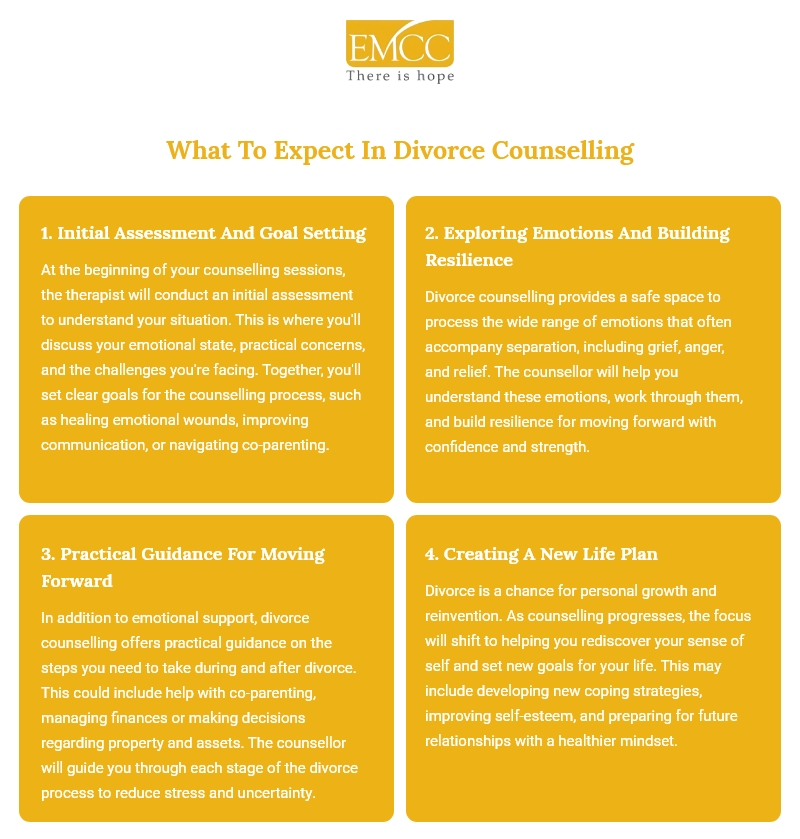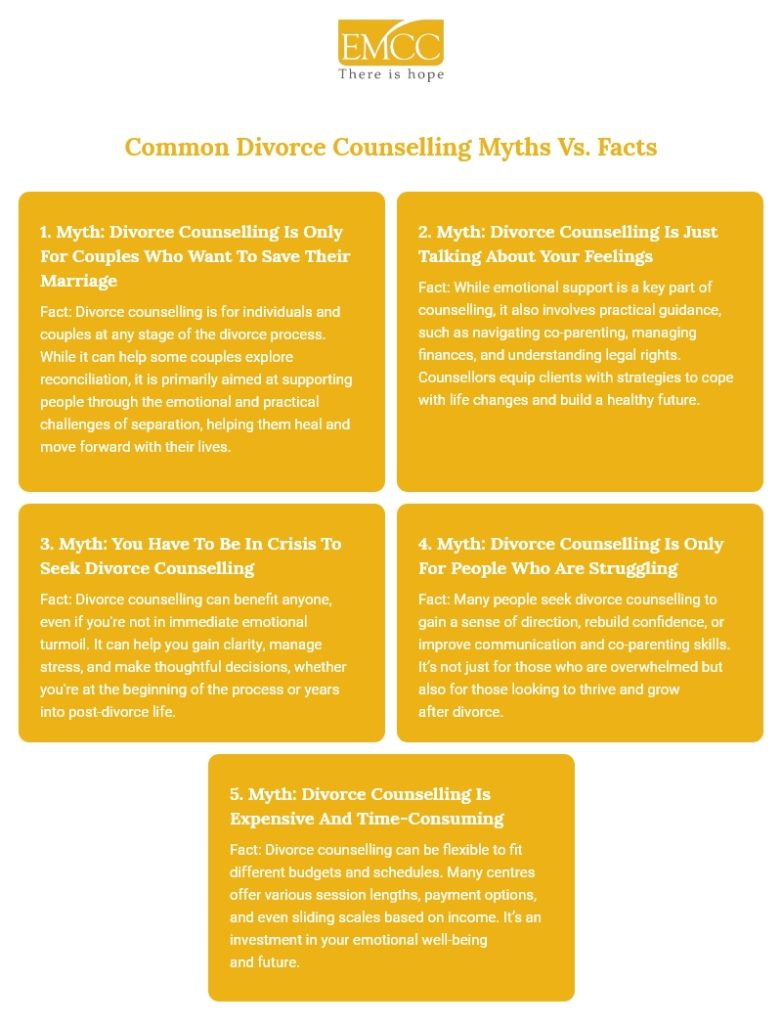
Separation and divorce are some of the most emotionally challenging experiences one can face. The end of a relationship can bring about a wave of sentiments which can be overwhelming. For families, the impact extends to children, extended family, and close friends. In these vulnerable times, professional support can make a significant difference, helping individuals and families process their emotions and rebuild their lives.
Divorce therapy provides a safe, non-judgmental space to explore feelings and navigate the complexities of relationship breakdowns. With the help of experienced counsellors, individuals can gain clarity, develop coping strategies, and move toward acceptance and healing.
In Singapore, cultural and societal factors, such as marriage expectations and family obligations, can add extra pressure during divorce. Therapy tailored to these contexts helps individuals manage these challenges and find balance.
This article explores the vital role of divorce counselling in supporting emotional well-being, personal growth, and healthier relationships. Through expert insights and practical examples, we highlight how therapy can be a transformative resource during one of life’s most difficult transitions.

Part 1: Understanding Separation and Divorce Therapy
Separation and divorce can be deeply emotional, bringing pain, uncertainty, and a sense of loss. These feelings often lead to stress and anxiety, but divorce therapy offers compassionate support to help individuals navigate these challenges.
1. The Emotional Strain of Separation or Divorce
Divorce can bring grief, anger, and loneliness, with additional stress for parents concerned about their children. The impact often extends to extended family and friends, creating widespread emotional strain. Divorce therapy provides a safe space to express and work through these emotions, offering relief and strategies for managing stress and anxiety.
2. What Is Separation and Divorce Therapy?
Separation and divorce therapy is a specialised form of professional help that provides support to individuals navigating the emotional and practical challenges of relationship breakdowns. It helps clients gain clarity and resilience during this difficult time.
- Emotional Support for Relationship Breakdowns
Therapy and counselling act as a safe harbour where clients can express their feelings of sadness, anger, betrayal, or confusion. This emotional outlet is essential for processing loss and developing acceptance.
- Practical Guidance for Managing Complex Emotions
In addition to providing emotional support during divorce, therapy provides strategies to manage complex emotions like grief or loneliness. Therapists help clients recognise and address their feelings constructively, guiding them toward emotional relief.
- Conflict Resolution and Communication Strategies
For couples, especially those with children, effective communication is vital. Therapy often includes conflict resolution and communication techniques, helping parents navigate co-parenting with respect and understanding, ensuring positive interactions for the children’s benefit.
3. Why Is Counselling Important During Divorce?
Divorce affects more than just emotions—it can bring financial and social changes as well. Counselling provides clarity and support, helping individuals navigate shifting roles, lifestyle adjustments, and the grieving process while regaining a sense of control.
- Managing Emotional, Financial, and Social Upheaval
Divorce can bring about significant changes, from the changes in roles to financial uncertainties. Counselling offers the support needed to manage these shifts, helping individuals adjust to their new reality with guidance and understanding.
- A Safe Space for Exploring Emotions and Healing
Counselling provides a secure and non-confrontational environment for individuals to explore their feelings. This freedom allows them to process their emotions and lighten the load of separation.
- Planning a Path Forward for Emotional Well-being
Ultimately, counselling focuses on healing and moving forward. It helps individuals build emotional resilience, guiding them towards healthier relationships and a renewed sense of purpose as they transition to the next chapter of their lives.

Part 2: The Role of Counselling in Navigating Separation and Divorce
Separation and divorce affect individuals on multiple levels—emotionally, mentally, and socially. But beyond the individual, these life changes also profoundly impact the family unit. Divorce therapy provides support for everyone involved, offering emotional guidance, practical strategies, and a path to healing.
2.1 Emotional Support for Individuals and Families
1. Impact on the Entire Family
Divorce affects more than just the couple; children, extended family, and friends often feel the strain. Parents must navigate their own emotions while supporting their children, while children may struggle with uncertainty and change. Couple counselling helps not only the couple but the wider family, fostering understanding and empathy that aid in the collective healing process.
2. Processing Grief, Anger, and Anxiety
Divorce can stir up a whirlwind of emotions after a separation or divorce—grief over the loss of the relationship, anger about unmet expectations, or anxiety about the future. Divorce therapy provides a supportive space to process these feelings, helping individuals rediscover their identity, navigate the emotional ups and downs of this transition and develop coping strategies for divorce adjustment to manage them effectively. This emotional clarity helps prevent these intense feelings from spiralling into more severe mental health challenges.
3. Promoting Emotional Resilience
Resilience is the ability to bounce back from adversity, and it is the key to overcoming the challenges of divorce. Therapy helps individuals and families adapt, learn coping mechanisms, and thrive despite the changes. By fostering resilience, families are better equipped to handle future hurdles, from co-parenting to rebuilding their personal lives post-divorce.
4. Preventing Adverse Mental Health Outcomes
Divorce is a major life stressor and, if not addressed, can lead to adverse mental health outcomes such as depression, anxiety, or chronic stress. Early therapeutic intervention for separation helps prevent these outcomes by allowing individuals to process their emotions and articulate their struggles. This proactive approach helps maintain mental well-being and reduces feelings of isolation or hopelessness.
5. Support for Children and Their Emotional Well-being
Divorce can be especially hard for children, who may struggle to understand or express their emotions. They might feel guilty or scared, unsure of how to cope. Family counselling creates a safe, supportive space where children can share their feelings and gain age-appropriate guidance. This support not only helps ease their immediate emotional pain but also promotes healthier emotional development in the long term.
6. Open and Honest Family Communication
Communication can break down during separation or divorce, leading to misunderstandings and emotional strain. Counselling fosters open, respectful conversations where everyone can express their feelings. This reduces tension, promotes understanding, and ensures everyone feels heard. Family therapy for relationship breakdowns helps families navigate these challenges, providing clarity, stability, and hope for the future, even during such a difficult time.

2.3 Mediation and Conflict Resolution
Divorce may bring complex disputes around property, finances, and custody to light. These issues can quickly escalate without professional guidance, making mediation and conflict resolution crucial. Counselling complements this process by addressing the emotional challenges that can hinder productive mediation, promoting a more cooperative approach to resolving conflicts.
1. The Role of Mediation in Divorce Proceedings
Mediation provides a structured and neutral platform for both parties to discuss their needs and concerns, working towards mutually beneficial agreements. A mediator facilitates these discussions, ensuring the process remains focused and productive. This is especially useful in resolving legal and financial issues, helping to avoid long, contentious court battles.
2. Integrating Mediation with Counselling
While mediation focuses on practical agreements, counselling addresses the emotional complexities of divorce. It helps individuals process any feelings that might interfere with constructive dialogue. This combination of practical mediation and emotional support gives individuals the clarity and focus needed to reach resolutions.
3. Emotional Preparation for Mediation
Nevertheless, mediation can be unproductive if entered without emotional preparation. Divorce therapy helps individuals manage strong emotions beforehand, creating a calmer, more focused mindset. By addressing feelings of hurt, betrayal, or frustration, counselling ensures these emotions do not cloud judgement, allowing both parties to engage in mediation respectfully and constructively.
4. Benefits of Combining Mediation and Counselling
Integrating counselling with mediation offers a balanced, supportive approach to navigating divorce, bringing numerous benefits for both parties:
- Enhanced Empathy and Understanding: Counselling helps individuals better understand each other’s emotions and viewpoints. This empathy encourages more respectful dialogue, making finding common ground during mediation easier and increasing the likelihood of reaching agreements that work for everyone.
- Improved Communication: Through counselling, individuals learn to communicate more openly and honestly. This reduces misunderstandings and prevents conflicts from escalating, leading to smoother, more productive mediation sessions.
- Reduced Emotional Tension: Counselling helps individuals manage complicated feelings by addressing emotional issues before mediation. This emotional preparation ensures personal emotions don’t interfere with the mediation process, allowing for a clearer focus on practical resolutions.
- Facilitated Conflict Resolution: Counselling equips individuals with tools to resolve disputes constructively, making mediation more effective. This collaborative approach reduces ongoing conflict and supports more peaceful negotiations.
- Healthier Post-Divorce Interactions: The combination of counselling and mediation fosters healthier post-divorce interactions. With improved communication and emotional understanding, both parties are better prepared to handle co-parenting, finances, and other shared responsibilities moving forward.
5. Resolving Disputes Over Property, Custody, and Finances
Mediation services for couples help guide discussions over these contentious topics, while counselling supports individuals in managing the emotional weight that comes with them.
Custody arrangements can bring up guilt or fear, and financial talks might stir resentment. Divorce therapy helps individuals handle these feelings, making negotiations more cooperative and productive.
6. Counselling Support for Ongoing Conflict Resolution
Conflict doesn’t always end after mediation. Continued counselling helps individuals adjust to new roles, co-parenting, or financial changes, preventing issues from escalating. Mediation and counselling offer a strong framework for resolving disputes and easing the transition to post-divorce life.

Part 3: Specific Areas of Divorce Counselling
3.1 Coping with Loss and Grief
Divorce is often accompanied by profound emotional pain, as individuals mourn not just the relationship but the dreams and plans they had for the future. Divorce therapy helps people process these emotions and move forward with renewed strength.
- Sense of Loss in Divorce
The emotional weight of divorce can feel like a profound loss, similar to grief. It’s not just about losing a partner but also the shared memories, lifestyle, and even connections with family and friends. The sense of losing security, love, or stability can be just as overwhelming as the separation itself.
- Integration of Grief Counselling into Divorce Therapy
Grief counselling is a core part of divorce therapy, helping individuals navigate feelings of sadness, anger, and confusion. Counsellors offer a supportive space where clients can express their emotions, reducing the risk of unresolved grief affecting their ability to move on.
- Understanding Grief Responses in Divorce
Divorce can trigger a range of emotions, from anger to denial and even acceptance. These feelings often follow the same stages of grief. Counsellors help clients understand and validate these emotions, reassuring them that these responses are natural and part of the healing process.
- Facilitating Emotional Movement
The goal of divorce counselling is to help clients move through their grief and not stay stuck in negative emotions. Counsellors guide individuals through reflective exercises, communication strategies, and visualisation techniques to process their feelings and make room for healing and personal growth. Coping with the loss of a marriage isn’t about erasing the pain but learning to live with it in a healthy way. With the right support, individuals can emerge from this experience with a renewed sense of self and confidence in the future.
3.2 Financial and Practical Support During Divorce
In addition to emotional challenges, divorce can also introduce significant financial and practical concerns. The uncertainty about finances can add to the stress of separation, making it harder to focus on healing. Divorce counselling offers holistic support, addressing both emotional well-being and practical issues.
- Financial Instability During Separation
Financial challenges are common in divorce, as assets, income, and expenses are divided. Individuals may face immediate concerns, such as managing household expenses on a single income, securing housing, or covering legal fees. Adjusting to this new financial reality can feel overwhelming, especially during such an emotional time. Counselling provides space to discuss these concerns, prioritise financial needs, and explore practical solutions with guidance.
- Practical Aspects of Divorce Addressed Through Counselling
Divorce therapy also supports individuals in managing the emotional challenges of separation, while mediators may be better suited to handling practical matters like asset division, maintenance payments, and child support. However, counsellors can still provide guidance on adjusting to new living arrangements and lifestyle changes, helping clients feel more emotionally prepared and less overwhelmed during this transition.

3.3 Moving Forward After Divorce
While often painful, divorce can also mark a new beginning—an opportunity for personal growth, healing, and renewal. With the support of divorce counselling, individuals can navigate this transition, rediscover themselves, and build resilience for a brighter future.
- Rediscovering Self-Identity Post-Divorce
The end of a marriage can leave individuals feeling lost, especially when it comes to their sense of self. Divorce counselling provides an opportunity to reflect on what truly matters and to reconnect with personal values, needs, and aspirations. This process allows individuals to rediscover their independence and redefine who they are outside of their former relationship, helping them move forward with renewed purpose.
- Opportunities for Self-Discovery
Divorce also presents a chance for introspection, where individuals can reflect on their strengths and areas for growth. Counsellors guide clients in exploring their emotions and aspirations, helping them heal from past wounds and turn emotional pain into opportunities for growth. This self-discovery fosters greater understanding and positions clients for healthier, more fulfilling futures.
- Fostering Resilience and Personal Growth
The emotional toll of divorce can leave many feeling vulnerable or uncertain about the future. Through divorce therapy, individuals are encouraged to view this time as an opportunity for transformation. They’re supported in setting new goals, discovering passions, and embracing change, all of which help build confidence and a positive outlook for the future.
- Support for Building New Relationships
As healing progresses, many individuals may consider new relationships. Divorce counselling provides support in navigating the complexities of dating, addressing fears about trust and vulnerability. Counsellors help clients approach future relationships with a healthy mindset, ensuring they are ready to build intimacy and trust with clarity and emotional maturity.
- Encouraging Open Communication in New Relationships
Good communication is the foundation of any healthy relationship. Counsellors help individuals develop skills for honesty, transparency, and emotional openness—ensuring that future relationships are built on trust and understanding. By learning these skills, individuals can avoid repeating negative patterns from past relationships and foster stronger, healthier connections moving forward.

Frequently Asked Questions
Here are some common questions people often have about divorce counselling:
1. How long does divorce counselling typically last?
The length of divorce counselling depends on your unique needs and situation. Some people find that short-term sessions focused on specific issues are enough, while others may need longer-term support throughout and even after the divorce process. A qualified counsellor will assess your needs and recommend a plan that works best for you, ensuring that you receive the support necessary to navigate this challenging time.
2. Can divorce counselling prevent a separation?
Divorce counselling isn’t designed to prevent separation but rather to help individuals and couples cope with its emotional and practical aspects. However, if both partners are open to reconciliation, couples therapy can provide a place to explore whether saving the marriage is possible. It’s all about fostering an environment where both parties can express their feelings openly and honestly.
3. How do I choose the right counselling practice in Singapore?
When looking for a counselling centre in Singapore, find one that is staffed by qualified professionals with experience in separation and divorce counselling. Take time to research centres that offer counselling and mediation services, and read testimonials or reviews to make sure they provide the tailored support you need. Choose a place where you feel comfortable and supported, as this will play a role in your healing process.

In conclusion, moving forward after divorce is a multifaceted process that involves emotional healing, personal growth, and the ability to create new, healthy connections. With the right support through divorce therapy, individuals can embrace this new chapter in their lives with resilience, self-awareness, and optimism.
Whether you’re navigating grief, adjusting to life post-divorce, or facing challenges in co-parenting, professional guidance can provide the clarity and support needed to move forward. At Eagles Mediation and Counselling Centre, we are dedicated to supporting you through every step of your journey with empathy, expertise, and a person-centred approach. Our experienced team is here to equip you with the tools and strategies needed to heal, rebuild, and thrive.
Take the first step towards healing today. Contact us to learn more about our services and discover how we can support your emotional well-being and personal growth during this transition.

